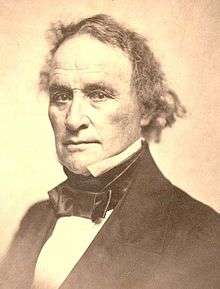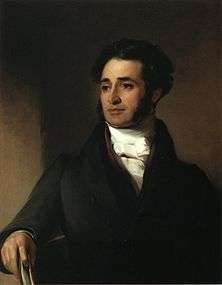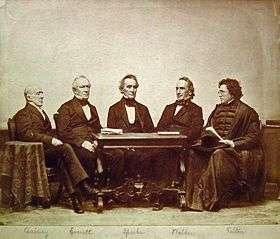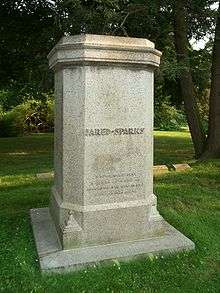Jared Sparks
| Jared Sparks | |
|---|---|
 | |
| 17th President of Harvard College (now Harvard University) | |
|
In office 1849–1853 | |
| Preceded by | Edward Everett |
| Succeeded by | James Walker |
| 1st McLean Professor of Ancient and Modern History Harvard College | |
|
In office 1838–1849 | |
| 16th Chaplain of the United States House of Representatives | |
|
In office December 10, 1821 – December 5, 1822 | |
| Preceded by | John Nicholson Campbell |
| Succeeded by | John Brackenridge, D.D. |
| Personal details | |
| Born |
May 10, 1789 Willington, Connecticut |
| Died |
March 14, 1866 (aged 76) Cambridge, Massachusetts |
| Spouse(s) |
1832, Frances Ann Allen, d. 1835. 1839, Mary Crowninshield Silsbee. |
| Alma mater | Phillips Exeter Academy, Harvard College, (now Harvard University) |
| Profession | Historian, Educator, and Minister |
| Religion | Unitarian |
Jared Sparks (May 10, 1789 – March 14, 1866) was an American historian, educator, and Unitarian minister. He served as President of Harvard College (now Harvard University) from 1849 to 1853.
Biography
Born in Willington, Connecticut, Sparks studied in the common schools, worked for a time at the carpenter's trade, and then became a schoolteacher. In 1809–1811, he attended the Phillips Exeter Academy where he met John G. Palfrey, a lifelong friend. He graduated from Harvard College, (now Harvard University), with a (A.B. in 1815, and a A.M. in 1818). While an undergraduate, he was a member of the Hasty Pudding. In fact, he granted the Hasty Pudding their first club rooms at Harvard in Stoughton Hall 29 and 31. In 1812, he served as a tutor to the children of a family in Havre de Grace, Maryland. A few years later he taught in a private school at Lancaster, Massachusetts during 1815–1817. Sparks also studied theology and was college tutor in mathematics and natural philosophy at Harvard College in 1817–1819. In 1817–1818 he was acting editor of the North American Review.

He was the first pastor of the newly organized (1817), "First Independent Church of Baltimore" (in a prominent landmark structure at West Franklin Street at North Charles Street - which later became the "First Unitarian Church of Baltimore (Unitarian and Universalist)" after a 1935 merger with the Second Universalist Church at Guilford Avenue and East Lanvale Street) in Baltimore, Maryland, from 1819 to 1823, Dr. William Ellery Channing, (1780-1842), of the Federal Street Church in Boston, Massachusetts, delivering at his ordination, his famous discourse on Unitarian Christianity later known as "The Baltimore Sermon", which set out the tenets and some principles for the developing theology and philosophy of "Unitarianism". By 1825, these principles led to the founding of the religious denomination of the American Unitarian Association, and later by 1961 into the merger which created the modern Unitarian Universalist Association of America. During this period, Sparks founded the Unitarian Miscellany and Christian Monitor (1821), a monthly, and edited its first three volumes. He was also chaplain of the United States House of Representatives in the U.S. Congress at the Capitol, in Washington, D.C. from 1821 to 1823;[1] and he contributed to the National Intelligencer and other periodicals.[2]
In 1823, his health failed and he withdrew from the ministry. Removing to Boston, he bought and edited in 1824–1830 the North American Review, contributing to it about fifty articles. He founded and edited in 1830, the American Almanac and Repository of Useful Knowledge, which was continued by others and long remained a popular annual.[2]
In 1825 Sparks was elected a Fellow of the American Academy of Arts and Sciences,[3] and in 1827 a member of the American Antiquarian Society.[4] He later served as the society's secretary for foreign correspondence from 1846 to 1866.[5]
After extensive researches at home and (1828–1829) in London and Paris, he published The Writings of George Washington (12 volumes, 1834–1837; redated 1842), his most important work; and in 1839 he published separately the Life of George Washington (abridged, 2 volumes, 1842). The work was for the most part favorably received, but Sparks was severely criticized by Lord Mahon (in the sixth volume of his History of England) and others for altering the text of some of Washington's writings. Sparks defended his methods in A Reply to the Strictures of Lord Mahon and Others (1852). The charges were not wholly justifiable, and later Lord Mahon (Stanhope) modified them. While continuing his studies abroad in 1840–1841, Sparks discovered in the French archives the red-line map, which, in 1842, came into international prominence in connection with the dispute over the north-eastern U.S.-Canadian boundary and the "Aroostook War" between the State of Maine in the United States and the Province of New Brunswick in Canada.[2]
Professorship

Sparks was one of the American intellectuals who received French author and traveler Alexis de Tocqueville during his 1831–1832 visit to the United States, his extensive conversations and subsequent correspondence informing de Tocqueville's best-known work Democracy in America.
In 1842 Sparks delivered 12 lectures on American history before the Lowell Institute in Boston. In 1838–1849 he was the first McLean Professor of Ancient and Modern History at Harvard, endowed by the will of wealthy merchant John McLean (1761-1823).[6] His appointment to this position, says his biographer, was the first academic encouragement of American history, and of original historical research in the American field. In 1849 he followed famed orator Edward Everett (the featured speaker at the dedication of the Gettysburg National Cemetery on November 19, 1863, after the Battle of Gettysburg, delivering a 2-hour speech before the "few prepared remarks" later called the "Gettysburg Address" of President Abraham Lincoln) as president of Harvard College, and moved into a home on campus now called Treadwell-Sparks House. In 1853 he retired on account of failing health, and devoted the rest of his life to his private studies. For several years he was a member of the Massachusetts Commonwealth Board of Education.
Death

Jared Sparks died on March 14, 1866, in Cambridge, Massachusetts and was buried in Mount Auburn Cemetery. His valuable collection of manuscripts and papers went to Harvard University; and his private library and his maps were bought by Cornell University. He was a pioneer in collecting, on a large scale, documentary material on American history, and in this and in other ways rendered valuable services to historical scholarship in the United States.
Works
Other works by Sparks include:
- A sermon delivered at the ordination of the Rev. Jared Sparks, to the pastoral care of the First Independent Church in Baltimore. (1819)
- Memoirs of the Life and Travels of John Ledyard (1828);
- The Diplomatic Correspondence of the American Revolution (12 volumes, 1829–1830; redated 1854);
- Life of Gouverneur Morris, with Selections from his Correspondence and Miscellaneous Papers (3 volumes, 1832);
- A Collection of the Familiar Letters and Miscellaneous Papers of Benjamin Franklin (1833);
- The Works of Benjamin Franklin; with Notes and a Life of the Author (10 vols, 1836–1840; redated 1850), a work second in scope and importance to his Washington;
- Correspondence of the American Revolution; being Letters of Eminent Men to George Washington, from the Time of his taking Command of the Army to the End of his Presidency (4 volumes, 1853);
He also edited the Library of American Biography, in two series (10 and 15 volumes, respectively, 1834–1838, 1844–1847), - - to which he contributed articles on the lives of Gen. "Mad" Anthony Wayne, Henry Vane the Younger, Ethan Allen, spy, Gen. Benedict Arnold, explorer Jacques Marquette, explorer René Robert Cavelier, Sieur de La Salle, Kazimierz Pulaski ("Count Pulaski"), Jean Ribault, Gen. Charles Lee and John Ledyard, the last a reprint of his earlier work.
In addition, he aided Henry D. Gilpin in preparing an edition of the Papers of James Madison (1840), and brought out an American edition of William Smyth's Lectures on Modern History (2 volumes, 1841), which did much to stimulate historical study in the United States.
Memorials
Famous historian Francis Parkman's The Conspiracy of Pontiac (1851), was dedicated to Sparks.
Memorial plaques and historical displays with portraits of Channing, Sparks and others in the historical exhibit area of the First Unitarian Church of Baltimore (Unitarian and Universalist). The congregation also observes and commemorates the annual anniversary of "The Baltimore Sermon" of May 5, 1819, on the first Sunday in May with a "Union Sunday", with a featured sermon/homily/address by a noted invited speaker and attended by the ministers and members of the Unitarian churches in Maryland along with other visiting ecumenical members of other local Christian churches and those interested in the religious history of America and the city/state. P
See also
- Bibliography of George Washington (where many of Sparks' books are listed)
Notes
- ↑ "History of the Chaplaincy, Office of the Chaplain". Retrieved 2008-09-14.
- 1 2 3 Corbin 1911.
- ↑ "Book of Members, 1780–2010: Chapter S" (PDF). American Academy of Arts and Sciences. Retrieved September 13, 2016.
- ↑ American Antiquarian Society Members Directory
- ↑ Dunbar, B. (1987). Members and Officers of the American Antiquarian Society. Worcester: American Antiquarian Society.
- ↑ books.google.com
References
 Corbin, William Lee (1911). "Sparks, Jared". In Chisholm, Hugh. Encyclopædia Britannica (11th ed.). Cambridge University Press.
Corbin, William Lee (1911). "Sparks, Jared". In Chisholm, Hugh. Encyclopædia Britannica (11th ed.). Cambridge University Press.
Further reading
- Herbert B. Adams, The Life and Writings of Jared Sparks (2 volumes, Boston, 1893).
- Brantz Mayer, Memoir of Jared Sparks (1867), prepared for the Maryland Historical Society.
- George E. Ellis, Memoir of Jared Sparks (1869), reprinted from the Proceedings of the Massachusetts Historical Society for May 1868.
External links
- Works by Jared Sparks at Project Gutenberg
- Works by or about Jared Sparks at Internet Archive
- Jared Sparks Papers – Houghton Library, Harvard University.
- Tocqueville in Cambridge segment from C-SPAN's Alexis de Tocqueville Tour - Features Peter Gomes discussing Sparks and his meeting with Tocqueville.
- Website for the First Unitarian Church of Baltimore (Unitarian and Universalist), West Franklin Street and North Charles Street; Baltimore, Maryland 21201.
| Religious titles | ||
|---|---|---|
| Preceded by John Nicholson Campbell |
Chaplain of the United States House of Representatives December 3, 1821 – December 2, 1822 |
Succeeded by John Brackenridge, D.D. |
| Academic offices | ||
| Preceded by Edward Everett |
President of Harvard University 1849–1853 |
Succeeded by James Walker |